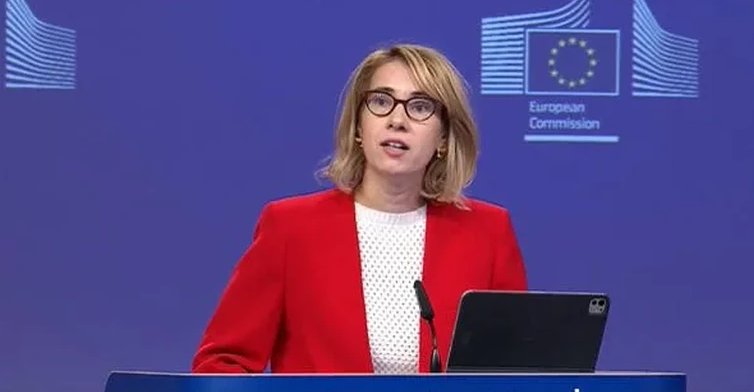Listen to the article
The European Union has escalated its diplomatic standoff with Georgia, accusing the country’s government of deliberately spreading disinformation following a controversial leaked letter from the EU ambassador to Tbilisi.
At a press briefing in Brussels on Friday, European Commission spokesperson Anita Hipper addressed claims made by Georgian officials regarding the country’s EU accession process. Hipper characterized recent statements from Tbilisi as “informational propaganda” designed to distract from Georgia’s deteriorating democratic situation.
“What we are witnessing is a clear attempt by Georgian authorities to shift attention away from the facts on the ground,” Hipper stated. She emphasized that the EU has documented Georgia’s democratic regression through multiple official assessments released since mid-2024.
The dispute intensified this week after Georgian television channel Rustavi 2 published a confidential letter dated November 5 from EU Ambassador Pawel Herczynski to the Georgian Foreign Ministry. The letter confirmed that Georgia’s participation in several EU-funded regional programs focusing on security and combating organized crime had been suspended “in light of the specific circumstances in Georgia.”
The letter referenced the European Council’s June 2024 conclusions that effectively put Georgia’s EU accession process on hold due to democratic concerns. However, Georgian officials, including Parliament Vice Speaker Nino Tsilosani, quickly seized on the letter as evidence supporting the ruling Georgian Dream party’s narrative that it was Brussels, not Tbilisi, that initially suspended the membership process.
Hipper directly countered this interpretation, stating that Georgia’s democratic backsliding has been well-documented by EU officials for months. “The June 2024 Commission assessment should have served as an initial wake-up call for Georgian leadership to change course,” she said.
Instead of addressing EU concerns, Hipper noted that the situation has worsened considerably. “What we have witnessed since then is an escalation of government actions that move Georgia further away from EU standards, including politically motivated prosecution of opposition leaders, arrests of journalists, and violent suppression of peaceful protesters.”
The spokesperson emphasized that the EU’s most recent enlargement report reaffirms that “Georgia remains a candidate country in name only” due to its failure to implement recommended democratic reforms.
The diplomatic tension comes amid growing concerns about Georgia’s political trajectory under the Georgian Dream party, which critics accuse of increasingly authoritarian tendencies and pro-Russian leanings. The party secured a controversial victory in October’s parliamentary elections, which opposition groups and international observers claimed were marred by irregularities.
Georgia was granted EU candidate status in December 2023, a significant milestone that initially prompted celebrations across the country, where public support for European integration consistently polls above 80 percent. However, relations between Tbilisi and Brussels deteriorated rapidly in 2024 after the Georgian government pushed through controversial legislation mirroring Russian foreign agent laws.
The EU has grown increasingly critical of what it describes as democratic backsliding in Georgia, particularly regarding media freedom, judicial independence, and treatment of civil society organizations. Multiple high-profile arrests of opposition figures and journalists have drawn international condemnation in recent months.
Analysts suggest the current diplomatic spat reflects a deeper struggle within Georgian politics between the country’s pro-Western aspirations and the ruling party’s increasingly illiberal governance model. The suspension of Georgia’s participation in EU security programs represents a concrete consequence of this deteriorating relationship, potentially impacting the country’s ability to address regional security challenges.
As tensions continue to escalate, the EU appears determined to maintain pressure on Tbilisi while leaving the door open for re-engagement if the government changes course on democratic reforms.
Fact Checker
Verify the accuracy of this article using The Disinformation Commission analysis and real-time sources.




7 Comments
This dispute between the EU and Georgia highlights the challenges of navigating international relations in an era of heightened information warfare. I’m curious to learn more about the specific allegations and the broader context surrounding Georgia’s EU accession process.
The EU’s accusations against Georgia are serious, but I’d like to understand more about the context and Georgia’s perspective. Disinformation is a growing challenge, so it’s important to approach this issue objectively and find a path forward that upholds democratic principles.
Agreed, transparency and open communication between the parties will be key to resolving this dispute. It’s important to avoid escalating tensions and find a mutually acceptable solution.
This situation seems to reflect the complex geopolitical dynamics between the EU and Georgia. While the details are unclear, it’s concerning to see allegations of disinformation spreading. I hope both sides can engage in constructive dialogue to resolve this dispute.
The EU’s accusations against Georgia are troubling, but I’d hesitate to draw any firm conclusions without a more complete understanding of the facts. Disinformation is a complex issue, and I hope both parties can engage constructively to find a path forward.
Well said. Maintaining an impartial and fact-based approach is crucial in these types of geopolitical disputes. I’m hopeful that open dialogue can help shed light on the situation and identify a mutually acceptable resolution.
This situation highlights the delicate balance between national sovereignty and alignment with international norms. I’m curious to learn more about the specific allegations and Georgia’s response. Resolving these types of disputes requires nuance and good-faith efforts from all sides.